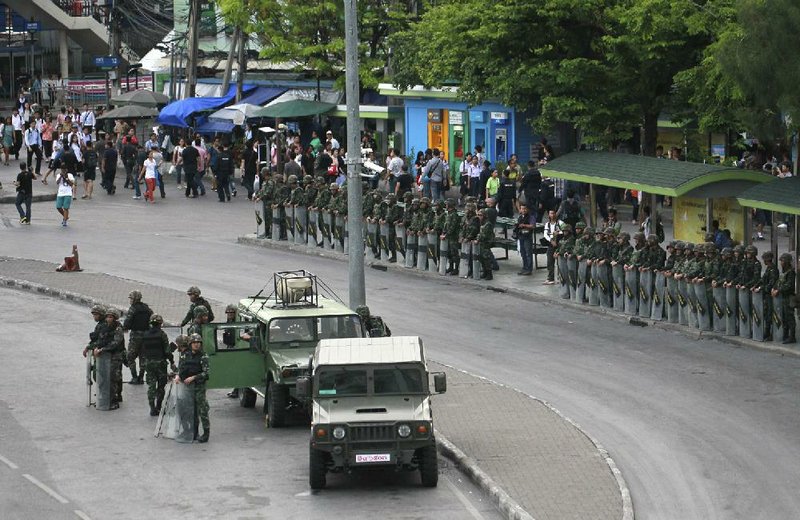BANGKOK — More than 1,000 Thai troops and police sealed off one of Bangkok’s busiest intersections Thursday to prevent a protest, as authorities said they would no longer allow any demonstrations against last week’s military coup.
Truckloads of soldiers blocked all roads to the capital’s Victory Monument in a show of force at the height of evening rush hour in an area that serves as one of the city’s commuter bus hubs.
More than a dozen police prisoner trucks were parked along the emptied roundabout, but there was little sign of protesters, who have been out almost daily in defiance of a ban on political gatherings.
A Belgian man was detained for displaying a T-shirt saying “Peace Please,” and two Thai women were taken away in a police truck after they showed signs with anti-coup messages.
The anti-coup demonstrations have been generally small and mostly leaderless, but protesters had planned to gather Thursday and called for a mass rally Sunday.
Gen. Somyot Poompanmoung, the deputy national police chief, said the small protests would no longer be allowed.
He said nine companies of soldiers and police — about 1,350 men— were deployed in Thursday’s operation.
“We know their rally is mainly for symbolic reasons, but it’s against the law,” he said. “We have to keep the law sacred.”
Earlier, in another part of the city, about 100 students on the campus of Thammasat University held an anti-coup protest, which ended peacefully.
The army deployment came a day after hundreds of protesters gathered at Victory Monument and outnumbered soldiers, with scuffles breaking out between the groups.
The mounting tension comes a week after the army seized power, overthrowing a government that won a landslide election victory three years earlier.
The army says it had to act to restore order after seven months of increasingly violent political turbulence.
The army told foreign journalists Thursday that it eventually plans to hold elections, but offered no time frame or road map for guiding the country back to democratic rule.
“We neither have any ambition nor desire to cling to power,” said Lt. Gen. Chatchalerm Chalermsukh, the army’s deputy chief of staff.
“We will definitely have an election,” he said. But he added, “This will take some time. If you ask me how long it will take, that’s difficult to answer.”
Chatchalerm cited the anti-coup protests as a reason that elections cannot take place immediately.
The United States, a long-standing ally of Thailand, said Thursday, however, that there isn’t a legitimate reason to delay elections.
“We urge the military council to facilitate an inclusive and transparent electoral process and we encourage them to do that soon,” State Department spokesman Jen Psaki said in Washington.
In the past week, the junta has acted to silence its critics and has warned that it will not tolerate dissent.
It has summoned more than 250 people, including members of the government it ousted and other leading political figures, journalists, scholars and activists seen as critical of the regime. Roughly 70 people are still in custody.
Several political figures, mostly on the pro-government side, were held incommunicado for a week and freed only after signing waivers agreeing not to say or do anything that could stir conflict.
Foreign news channels such as CNN and BBC have been blocked, and several Thai news outlets have been shut down or are practicing self-censorship.
The military has said it will crack down on online speech it considers inflammatory.
It denied responsibility for a brief and partial shutdown of Facebook in Thailand on Wednesday, but has begun targeting websites deemed threatening. Among those now blocked is the Thailand page of Human Rights Watch.
Pisit Pao-in, an official at the Information and Communication Technology Ministry, said Thursday that the government would ask the popular Japan-based instant messaging service LINE to cooperate in blocking users who send material considered undesirable by the military regime.
At the center of Thailand’s deep political divide is Thaksin Shinawatra, a former prime minister supported by many rural Thais for his populist programs but despised by others — particularly Bangkok’s elite and middle classes — over allegations of corruption, abuse of power and disrespect for the monarchy.
He was ousted in a 2006 coup and lives abroad in self-imposed exile, but held great influence over the overthrown government, which had been led by his sister until a court ousted her this month.
Despite the latest political upheaval, life has continued largely as normal in most of the country.
A curfew remains in effect, although it was shortened Wednesday to midnight to 4 a.m., from 10 p.m. to 5 a.m.
Information for this article was contributed by Jocelyn Gecker and Mathew Pennington of The Associated Press.
A Section on 05/30/2014


